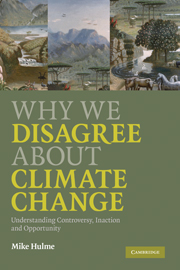Book contents
- Frontmatter
- Contents
- List of Figures
- List of Tables
- List of Boxes
- Acknowledgements
- Foreword
- Preface
- 1 The Social Meanings of Climate
- 2 The Discovery of Climate Change
- 3 The Performance of Science
- 4 The Endowment of Value
- 5 The Things We Believe
- 6 The Things We Fear
- 7 The Communication of Risk
- 8 The Challenges of Development
- 9 The Way We Govern
- 10 Beyond Climate Change
- Bibliography
- Index
- References
6 - The Things We Fear
Published online by Cambridge University Press: 05 April 2013
- Frontmatter
- Contents
- List of Figures
- List of Tables
- List of Boxes
- Acknowledgements
- Foreword
- Preface
- 1 The Social Meanings of Climate
- 2 The Discovery of Climate Change
- 3 The Performance of Science
- 4 The Endowment of Value
- 5 The Things We Believe
- 6 The Things We Fear
- 7 The Communication of Risk
- 8 The Challenges of Development
- 9 The Way We Govern
- 10 Beyond Climate Change
- Bibliography
- Index
- References
Summary
Introduction
Time is running out, and fast. Rising carbon dioxide levels and higher temperatures will soon set in motion potentially catastrophic changes that will take hundreds or even millions of years to reverse.
This was the way in which the outcome of an international conference on Avoiding Dangerous Climate Change held in Exeter, UK, in February 2005 was reported in the British science magazine New Scientist. Under headlines such as ‘The edge of the abyss’ and ‘Act now before it's too late’, the science reported at the conference rapidly found its way around the world and into the cabinet rooms of governments, the board rooms of companies, and the living rooms of the public. A month or two later, the US weekly news magazine Time ran a front cover special on global warming with an equally intimidating title: ‘Climate change: be worried, be very worried’.
The Exeter Conference signalled a step-change in the ways in which the risks associated with climate change were conceived, presented and debated in the public sphere. Previously, climate change had usually been discussed in terms of incremental changes to the average conditions of climate; incremental changes to which it might – at least in some regions and with some foresight – be possible to adapt. There had also been attention paid to changes in the likelihood of the extremes of weather.
- Type
- Chapter
- Information
- Why We Disagree about Climate ChangeUnderstanding Controversy, Inaction and Opportunity, pp. 178 - 210Publisher: Cambridge University PressPrint publication year: 2009

